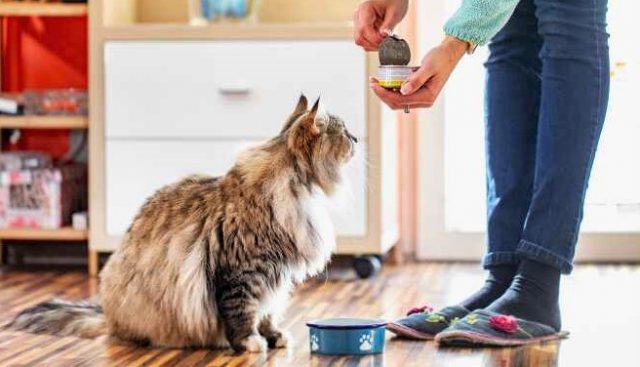Many people don’t follow the vet-recommended kitten food as they believe that veterinarians are not very good at understanding food. In fact, as a veterinarian, I’ve been on a twenty-four-year diet of lectures, workshops, seminars, and masterclasses, not to mention our many years of experience since then. But there’s one thing I should maybe even give as a surprise gift, it’s probably not something you’ve heard or read in online surveys!
Table of Contents
The vet recommended wet cat food vs dry cat food

Do you need to take your cat with wet food or dry? Of course, each of them has its own pros and cons, and it can be difficult to make a decision. As a veterinarian, and in the absence of any medical conditions, I recommend that you feed your cat a mixture of both wet and dry milk, and about 75% of the calories in the diet should come from canned cat food and the remaining 25% from dry food.
The vet recommended dry cat food
DRY FOOD IS CONVENIENT, ECO-FRIENDLY, AND ECONOMICAL.

For you, the owner of cats, dry food has a number of advantages. You should be a little less weight when you go shopping, you can use it without any problems, and you don’t have to go to the refrigerator with leftovers, for example.
You are responsible for your share with less packaging, and for the norm of paying less money, and wet food, because you don’t have to pay for water.” The cost savings are very significant for households with multiple cats in the house.
WITH THE HELP OF DRY FOOD, YOU CAN EASILY SUCCUMB TO THE CAT’S NATURAL EATING HABITS.

Feral cats receive 10 to 15 small prey items (or any part of them) within 24 hours, and your cats like to be very similar if they can be defined as follows: it is very common to have their own bowl of food, snacks, instead of filling their stomach, in the morning and evening when the dog is about to do it.
This way, you can include dry food in a bowl in your daily diet in the morning, and your cat should be able to help himself, he loves it. You should never do this with wet food, as it can be unpleasant and unsanitary. More than two or three wet food methods for working with cat owners are unacceptable.
The vet recommended wet cat food
WET FOOD IS DELICIOUS AND HEALTHY FOR MOST Cats.
Since wet food contains more water than dry food, the taste develops better and better, and the aroma becomes more intense. Also, I think that wet food tends to contain more protein than dry cat food.
WET FOOD PROVIDES PLENTY OF MOISTURE.

Wet food contains about 80% water, so it has a more or less active cat, which can relate to almost all liquid, only wet food is required. Thus, for animals that drink very little, are prone to kidney stones, constipation, or suffer from any kidney diseases, wet food can be useful. Sick cats are less dry and will have to pee, it is thinner, which facilitates the process of washing out crystals in the urine.
Veterinarian recommended kitten food brands to avoid
The truth is, there are hundreds of food brands out there, and most of them are just good for other cats. But for those of you who are willing to go the extra mile for your cats and dogs, there are a few food brands to avoid. I strongly recommend avoiding anything that pretends to be vegetarian or vegan – it’s unethical to use the power of these cats that have evolved as predators.
I would avoid those who spend more on marketing than on food. You can read reviews online, but I think I’ll also follow our guide below to make sure you don’t just collect the most popular products, choose the vet-recommended pet food.
Purina Pro Plan Focus Weight Management

While not a prescription diet, Purina’s pet food is one of the best-wet cat foods on the market today. As a veterinarian, I often use it as a less expensive, over-the-counter alternative for cat owners who are struggling to afford a lot of clinical and cost-effective diets. That’s only 79 calories in a jar, which means pet parents will easily be a part of it.
Cats should eat this food, you will get to have many small meals throughout the day, ideal for cat behavior and satiety (feeling full). Cats full of feeling, green for food, which can be a huge obstacle to being healthy and losing weight. Protein is also high, accounting for 54% (dry matter base), mac.
Royal Canin Calorie Control,
Designed for cats and humans, on the other hand, is the key to weight loss is burning more calories than you consume. Foods that are low in calorie density, since wet cat food has fewer calories per ounce of gold, fill it up without filling it up. However, for many of the products that fit this description, the Royal Canin Feed stands out as a vet-approved option.
A well-known company that has its roots in the veterinary sector-the company founded by the Royal Canin veterinarian is one of the best cat food brands recommended by veterinarians. Royal Canin produces food that is suitable for almost any cat in the world, taking into account specific conditions, health, race, and other requirements.
This recipe is designed with a weight in the back of my mind. Keeps track of a low-calorie, spare-wheel-focused meat ingredient list. The recipe uses pork giblets and chicken liver as the main ingredients. The food will provide great feedback from customers, with many customers saying that their cats love to eat this food and lose weight in the process.
Royal Canin Aging

This Royal Canin product has everything you need to make your old cat. Aging cats do have unique needs, and this is a diet that will help ensure that the best food is available for the cat as it ages. Royal Canines carefully study the effects of nutrition on kidney disease and have a well-balanced diet, as well as low levels of phosphorus in order to protect the body. Older cats should be at lower protein levels, but the protein should be of high quality and not be in 28% of the protein in the diet and also match older cats, which should be perfect.
It also contains added glucosamine and chondroitin to support joint health, although their levels are not as high as they are now, I usually recommend, so additional supplements are required.
You should also keep in mind that this is nutrition, it is only suitable for older cats without diseases, your cat suffers from kidney disease, thyrotoxicosis, diabetes, tooth decay, and joint diseases, they will be able to use a more specialized diet
Final Thoughts
Veterinarians who have not agreed with the basic ideas and karma are just perfect for any cat and do not blindly follow some of the veterinarian’s recommendations on nutrition.
As far as the food items listed in this article are favorites for many veterinarians, not every vet thinks they are the same thing. And this is not a veterinarian, an expert in the field of animal nutrition. If your veterinarian recommends a curative diet for a specific disease or provides general recommendations, ask questions and consult other sources before making a final decision on which foods are good for you.
You can also read: What is the Best Puppy Food for Small Breeds? | Top Rated Puppy Food In 2024
Conclusion
In conclusion, choosing the right food for kittens is essential for their growth and overall health. Despite common misconceptions about veterinarians’ expertise in pet nutrition, veterinarians undergo extensive training and have significant experience in understanding and recommending the best diets for pets. When it comes to feeding kittens, a combination of wet and dry foods is often recommended, with a focus on providing a balanced diet that meets their high energy and nutritional needs.
Dry food offers convenience, environmental benefits, and economic advantages. It is also suitable for free-feeding, allowing kittens to eat small meals throughout the day, which aligns with their natural eating habits. On the other hand, wet food is palatable, provides essential moisture, and is beneficial for cats prone to urinary and kidney issues.
It’s crucial to avoid brands that focus more on marketing than quality and those that promote vegetarian or vegan diets for cats. Trusted brands like Purina Pro Plan, Royal Canin, and Wellness offer high-quality options that cater to various health needs and life stages of kittens.
Ultimately, while veterinarians’ recommendations are valuable, it is essential for pet owners to ask questions, seek additional opinions, and make informed decisions based on their kittens’ specific needs and preferences.







